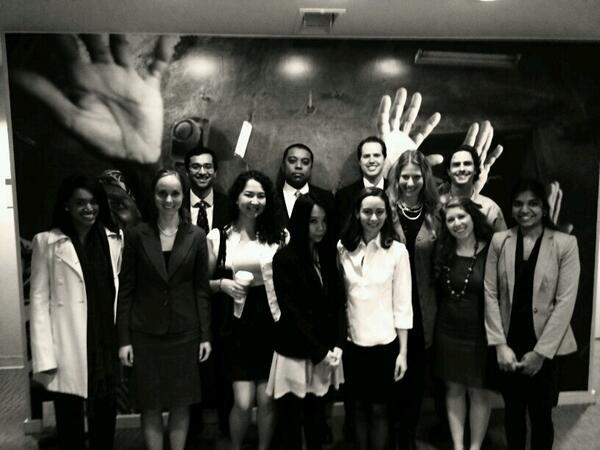April 9, 2014 – Daniel Holman
Last Friday, April 4, LIDS members traveled to Washington, D.C. for a day of meetings with law school alumni and others working in international development. The goal of the trip was to offer insights for students thinking about career options in development, whether as legal practitioners or in more cross-cutting roles. To provide an array of different perspectives, invited speakers included both lawyers and non-lawyers from a variety of institutions.
A first meeting with Jon Jacoby and Gawain Kripke from Oxfam and LIDS Advisory Board Member Katrin Kuhlmann of New Markets Lab offered views from the non-profit sector, with a focus on Oxfam’s work on Make Trade Fair and other campaigns aimed at channeling private sector behavior to benefit development.
At lunch, a series of meetings at Skadden LLP gave LIDS students the opportunity to hear from the firm’s D.C. Pro Bono Counsel and former Public Defender Don Salzman and Meghan Stewart, VP and Senior Counsel for LIDS/Orrick project client Public International Law and Policy Group (PILPG), about working for pro bono clients on development projects. Next, Skadden Counsel and former Chief Counsel of the Treasury Department’s Office of Foreign Assets Control (OFAC) Sean Thornton and USAID Director of Policy and Planning Steve Feldstein spoke about their work for the U.S. government. Skadden Counsel and HLS alumnus Jorge Kamine, Associates and HLS alumni Tyler Rosen and Jennifer Golden, and Associate Lauren Gaffney also participated.
Finally, the group met with 11 attorneys from the World Bank Legal Vice Presidency, led by Chief Counsel for Operations Policy and HLS alumnus Ferenc Molnar. The group shared stories from their careers advising the Bank on every aspect of its operations, from project frameworks to rule of law and regulatory issues. Students concluded the day with a happy hour in central DC that was attended by a number of HLS alumni in DC, including LIDS co-founder Alastair Green and members of the new Law and International Development Society at Georgetown Law Center.
LIDS wishes to thank Oxfam America and the World Bank for hosting meetings and LIDS 2013-2014 sponsor Skadden LLP for hosting and providing lunch and coffee. LIDS members attending included HLS JD students Kamola Kobildjanova and Marian Grove, HLS LLM students Amrita Khemka, Valeria Guimaraes de Lima e Silva and Anna Chuwen Dai, HLS JD/Fletcher MALD student Jacob Kuipers, HKS MA student Bevan Narinesingh, and LIDS Executive Board Members Becky Wolozin, Raj Banerjee, Maryum Jordan and Daniel Holman.




